Association of P53 Protein Overexpression with Clinicopathological Features of Oral Squamous Cell Carcinoma Patients in Bali
Abstract
Background: Oral cancer was a major health problem with a high incidence rate worldwide. Oral Squamous Cell Carcinoma (OSCC) in Bali, ranked as the second most common cancer after cervix carcinoma. Our understanding of OSCC hasn’t yielded a satisfactory clinical outcome; therefore, further studies about the role of biomolecular markers in OSCC are still needed. One of the biomolecular markers for prognosis and predictor for OSCC that has been a topic of research to date is p53. Method: This is a cross-sectional analytical study of 36 samples to determine the correlation between p53 overexpression with age group, tumor location, tumor stage, and tumor grade in OSCC patients. Data was processed descriptive and analytical using Chi-Square/Fisher 's Exact Test methods with a significance value of p <0.05 was considered significant. Results: From the 36 samples collected, the mean age was 55,19±14,712 years, 19 samples (52.8%) were women, 21 samples (58,3%) were ?60 years, 24 samples (66,7%) had OSCC on the postero inferior region, 19 samples (52,8%) were in high stage group, 22 samples (61,1%) had high grade OSCC, and 22 samples (61,1%) showed high p53 overexpression. There were significant differences in proportion between OSCC grade with p53 expression (Chi-square test p=0,013; r=0,416; OR=6,12 CI=95%) and between OSCC N stage with p53 expression (Fisher's Exact Test p=0,024; r=0,396; OR=6,33 CI=95%). Conclusion: There were significant differences in the proportion between OSCC grade and N stage with p53 expression. Therefore, p53 overexpression can be used as a prognostic indicator and predictor of lymph node involvement in OSCC.Downloads
Download data is not yet available.
Published
2016-04-30
How to Cite
WINATA, A. et al.
Association of P53 Protein Overexpression with Clinicopathological Features of Oral Squamous Cell Carcinoma Patients in Bali.
BALI MEDICAL JOURNAL, [S.l.], v. 5, n. 1, apr. 2016.
ISSN 2302-2914.
Available at: <https://ojs.unud.ac.id/index.php/bmj/article/view/21793>. Date accessed: 21 feb. 2026.
Issue
Section
Articles
Keywords
Oral Cavity Squamous Cell Carcinoma, p53, Clinicopathology.


